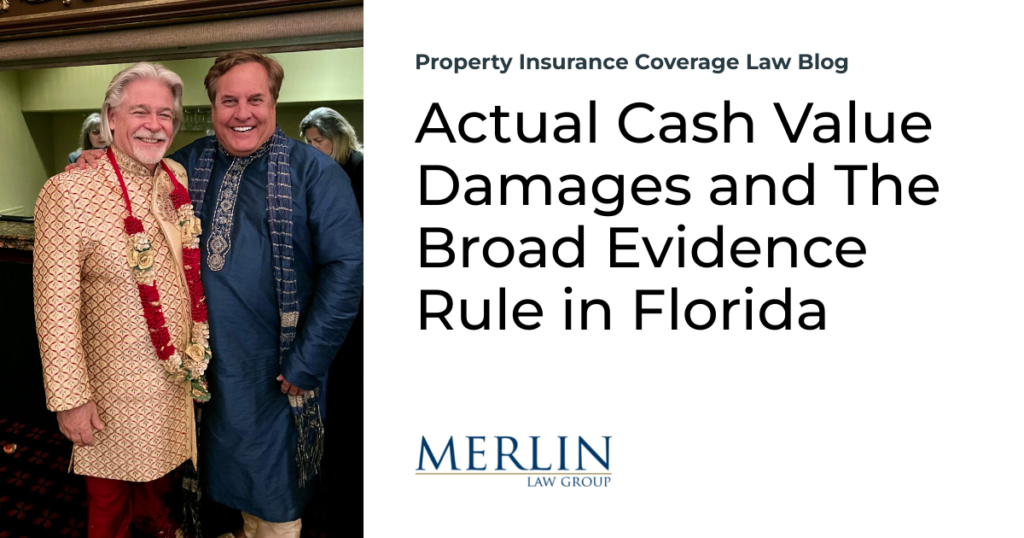Actual Cash Value Damages and The Broad Evidence Rule in Florida

A short and to-the-point appellate decision is worthwhile reading regarding actual cash value in Florida.1 The “as determined by us” trailing language in the policy’s definition was the insurance company’s undoing:
Tower Hill’s responsibility under the policy was to pay the ‘actual cash value’ of the loss. Ordinarily, ‘actual cash value’ is defined as the ‘replacement cost minus depreciation.’ Trinidad v. Fla. Peninsula Ins. Co., 121 So. 3d 433, 443 (Fla. 2013). At the close of SFR’s case, Tower Hill moved for directed verdict, pointing out that the cost to repair presented by SFR was insufficient proof of ‘actual cash value’ because it did not account for depreciation.
Under different circumstances, Tower Hill’s point might be well-taken. In this case, however, Tower Hill’s policy defines ‘actual cash value’ as:
‘[t]he cost to repair or replace covered property, at the time of loss or damage, whether that property has sustained partial or total loss damage, with material of like kind and quality, subject to a deduction for deterioration, depreciation and obsolescence as determined by ‘us.’…’
The language of the particular policy at issue in this case placed the burden to establish the depreciation on Tower Hill. Under this policy, SFR did not have the initial burden to prove the amount of depreciation.
A concurring opinion went even further:
While I agree with the result reached, I write to state that there is a separate reason the trial court should not have granted a directed verdict. When an insured is entitled to ‘actual cash value’ of a loss under the terms of an insurance policy, Florida courts have held that the ‘broad evidence rule’ applies. See Worcester Mut. Fire Ins. Co. v. Eisenberg, 147 So. 2d 575, 576 (Fla. 3d DCA 1962) (‘Florida will adhere to the so-called ‘Broad Evidence Rule.’ Under this rule, any evidence logically tending to establish a correct estimate of the value of the damaged or destroyed property may be considered by the trier of facts to determine ‘actual cash value’ at the time of loss.’).
SFR admitted into evidence an estimate prepared by Mills Mehr & Associates, Inc. for Tower Hill. That estimate provided the basis for Tower Hill’s determination of ‘actual cash value,’ and it included a 21% deduction for depreciation. Under the broad evidence rule, I see no reason why that percentage could not be used in conjunction with SFR’s estimate. Tower Hill argues that the calculation of a 21% deduction for depreciation cannot be used because SFR’s estimate was for replacement of a greater number of tiles. However, there is no indication that the tiles included in the Mills Mehr estimate were of a different age or had additional wear and tear than any other tile on the roof. In any event, Tower Hill’s argument would bear upon the weight afforded such evidence, not its admissibility.
Tower Hill pursues exactitude where Florida law does not require it. See McCall v. Sherbill, 68 So. 2d 362, 364 (Fla. 1953) (‘[D]amages are not rendered uncertain because they cannot be calculated with absolute exactness. It is sufficient that there be a reasonable basis of computation although the result may be only approximate.’); W. Boca Med. Ctr., Inc. v. Marzigliano, 965 So. 2d 240, 244 (Fla. 3d DCA 2007) (‘The ‘reasonable certainty’ rule for the calculation of damages does not require mathematical precision[.]’).
This concurring opinion is important. Rarely are damages exact when determining what is owed following loss to real property. Contractors charge varying amounts for the same scope of work. The quality and assurances of workmanship by the contractors vary as well. The methodology of repair may even be at issue. The theoretical damages of loss are usually a range of “reasonable” for approval at adjustment. However, juries and judges can only provide one number at the time of verdict.
For those wanting to study Florida law regarding actual cash value, I suggest you read, Do You Have a Florida Property Insurance Dispute Over Valuation? Understand the Differences Between Replacement Cost Value, Actual Cash Value and How the Broad Evidence Rule Works.
The above photo depicts Merlin Law attorney Dennis Bailey next to me at his Indian-themed wedding last night. Dennis grew up in a family of trial lawyers. His father was a trial lawyer. His brother Tim is still a judge, as Dennis Bailey was before joining our firm as our General Counsel and Trial Team member.
Thought For The Day
Fast is fine, but accuracy is everything.
—Wyatt Earp
1 SFR Services v. Tower Hill Prime Ins. Co., No. 6D23-118 (Fla. 6th DCA May 26, 2023).







